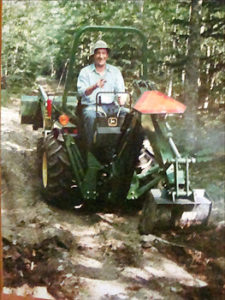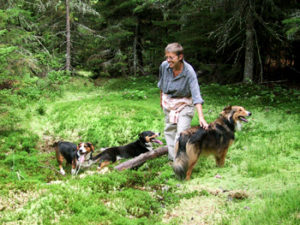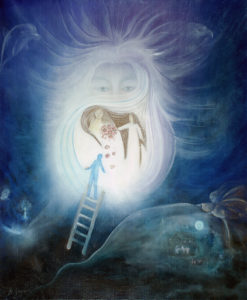“A Gift to Nature”
The Ducktrap Wildlife Preserve Story
By Harry Hollins,
Neighbor, Friend and Former Ducktrap Wildlife Preserve Director
I had come to my neighbors Hans and Brigitte Gautschi with the hope of understanding why a couple from Switzerland would create a wildlife preserve in Lincolnville, Maine. On a deeper level, I was interested in why anyone would set aside land for nature’s exclusive benefit. A number of people have given land into some form of safekeeping, but humans were always the underlying cause of their beneficence. Even lands designated for wilderness bestow services to the human population of immense importance: water storage, air cleansing, education, solace, and aesthetics, of just knowing they exist. In contrast, this preserve of Hans and Brigitte’s is untainted by any immediate and anthropomorphic interests.
Hans and Brigitte, he a tall spare man with the bearing befitting a successful European business executive and she an intensely intuitive artist with all the attributes of the Great Earth Mother, began their relationship with the American land back in 1979. Using vacation time, their goal was to find property in the northeast large enough to give them more privacy and more of a direct experience with nature than was possible anywhere in Europe. It was not until their third year of looking, in fact while they were returning to Boston and their flight home that a new place came on the market, which might suit them.
The chilly April day with rain falling steadily onto the already sodden snow suited their despondency over ever finding the land they dreamed about. But something about this property and its 200 acres of woodlands and old blueberry fields curling down to the eastern end of Pitcher Pond and back up the western flanks of Ducktrap Mountain, resonated viscerally with them. And it still possessed them powerfully enough to stir their facial muscles with emotions when I brought them back to that April day. “It was a powerful connection,” Brigitte said, and Hans nodded in agreement.
Over the ensuing years, the Swiss couple built a snug log cabin overlooking the pond and the watery bog land separating Pitcher from Knights Pond. Blueberry fields were reclaimed and forestry improvement projects initiated, including introducing a new strain of American chestnut and mass plantings of eastern Red Cedar. The work was endless but the rhythms of nature always refreshed them. Moose feeding belly deep in the ponds, migrations of warblers and waterfowl, loons calling fiercely out of the early morning mist, and deer yarding up in the ancients’ stands of fir and spruce – all worked to fine tune their new knowledge of nature and of themselves.
For Brigitte the new levels of awareness and feelings arising from the natural world demanded artistic expression. Shamanistic images of eagle, porpoise, pines, pond, and moon, all swirling in strangely glowing light, are recurring themes. W hile for Hans direct work on the land with his tractor and chainsaw and learning more about conservation from various University of Maine extension programs sufficed. And so it progressed until around 1990 when they became aware of a big demographic pulse hitting the mid coast area, with all its attendant ramifications for their “sanctorum.” This was the catalyst for creating a preserve, and the next six years much of Han’s vacation time was spent contacting neighbors and working out contracts of sale or rights of first refusal on many small and large parcels. Finally, in the summer of 1996, with over seven hundred acres and an endowment fund sufficient to maintain it in perpetuity, Hans and Brigitte announced that their Ducktrap Wildlife Preserve had been accomplished and would, henceforth, be preserved for the sole benefit of wildlife.
hile for Hans direct work on the land with his tractor and chainsaw and learning more about conservation from various University of Maine extension programs sufficed. And so it progressed until around 1990 when they became aware of a big demographic pulse hitting the mid coast area, with all its attendant ramifications for their “sanctorum.” This was the catalyst for creating a preserve, and the next six years much of Han’s vacation time was spent contacting neighbors and working out contracts of sale or rights of first refusal on many small and large parcels. Finally, in the summer of 1996, with over seven hundred acres and an endowment fund sufficient to maintain it in perpetuity, Hans and Brigitte announced that their Ducktrap Wildlife Preserve had been accomplished and would, henceforth, be preserved for the sole benefit of wildlife.
Ducktrap Wildlife Preserve is a jewel in whose facets every distinct non-marine habitat of mid-coast Maine sparkles. Pitcher Pond’s ecosystem includes ecological rarities such as pitcher plants and artic White Cedar. The Ducktrap River on its southern border is itself a keystone ecosystem due to the rare species of salmon still seeking its gravel beds to spawn. And the Preserve shines the brighter by not standing alone, contiguous as it is to the lands of Camden Hills State Park, Nature Conservancy, and Coastal Mountains Land Trust – all of which comprise over 2,000 acres of land protected from development.
These are the facts surrounding the creation of the Ducktrap Wildlife Preserve, but they left me no closer to understanding the revolutionary implications of the Gautschis’ selfless act. So I met with them shortly after the Preserve’s completion to ask them about the deeper, more personal nature of their gift. Hans was quick to say that land was still cheap enough in America to do something like this. When I pressed him further, he ducked another way, saying it was a healthy project for Brigitte to be involved with, and since she loved it… He left off with a downward turn of his head and then threw off another facile response: “When you leave this existence, your pockets are empty.” Despite the mischievous twinkle
in his eyes and the truth of the Swiss aphorism, Hans sensed the adequacy of his answers, because he went on voluntarily, clearly pushing deeper into himself. “Okay,” he admitted, “There is a moral duty here. We should use money in a positive way.” He paused and then continued more reflectively, “Anyway, we should leave Earth a better place for having lived here, yes?”
Yes, but. I looked at Brigitte for help because the gift still baffled me, and she respo nded. “All of what Hans says is true, but there is more. Wait I’ll get it.” She returned with one of her paintings. The painting captured all the elements I’ve seen in her other work but there was something more personal, more urgent in this one. Two images dominate the canvas. Highest in the picture is a marriage ceremony within a lunar figure’s chest. The ceremony is being observed as if from another, more realistic world by a male figure standing on the top rung of a ladder with a candle in one hand and a luminous wand in the other, as if waiting to guide the couple to earth. And below this, in the second image, floats a porpoise so transparent that only the moonlight reflecting off its wet body makes it visible. Draped over it is an angel watching two figures standing in the glow of candle light streaming from their log cabin as they reach out to a deer come to the clearing from the frosted woods. It seemed a reenactment of the sacred ceremony above.
nded. “All of what Hans says is true, but there is more. Wait I’ll get it.” She returned with one of her paintings. The painting captured all the elements I’ve seen in her other work but there was something more personal, more urgent in this one. Two images dominate the canvas. Highest in the picture is a marriage ceremony within a lunar figure’s chest. The ceremony is being observed as if from another, more realistic world by a male figure standing on the top rung of a ladder with a candle in one hand and a luminous wand in the other, as if waiting to guide the couple to earth. And below this, in the second image, floats a porpoise so transparent that only the moonlight reflecting off its wet body makes it visible. Draped over it is an angel watching two figures standing in the glow of candle light streaming from their log cabin as they reach out to a deer come to the clearing from the frosted woods. It seemed a reenactment of the sacred ceremony above.
When I looked at Brigitte, she said ever so softly, “Yes, this is so.” I nodded and turned to Hans and saw tears welling. So there it was. Still unspeakable. But that was their answer. Making the nature the blessing and not ourselves only is a gift so pure and so deep that maybe only art can represent it and only the natural biotic community whose gift it is can truly understand. So I left as gracefully as I could, knowing that no easy answers were available for the Ducktrap Wildlife Preserve next to my farm, which actually is as it should be for a gift to nature so unique and extraordinary.
***
The Gautschi Family and the Ducktrap Wildlife Preserve extend a heartfelt appreciation to Harry Hollins for this beautiful story and also for his genuine friendship and support over the years. Harry was significantly impactful throughout the inception and early years of the Preserve and then helping to guide the Preserve through a difficult transition after Hans Gautschi’s passing in 2004. Brigitte Gautschi recalls the challenges she personally faced when assuming a leadership role at the Preserve after losing her husband. She extends deep gratitude to Harry for his honesty, loyalty and encouragement during this challenging and pivotal time. We all extend a thank you to Harry, for his faithful and meaningful contributions.
THANK YOU, HARRY!


